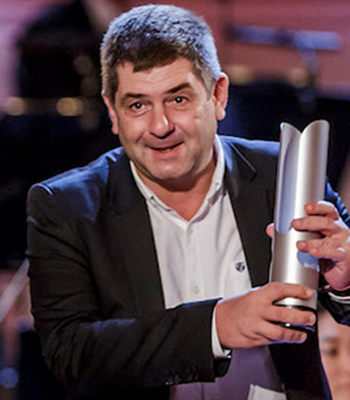Capriccio, a classical label based in Vienna, was founded by Delta Music in 1982. From the outset, the label’s aim was not to compete with the major companies, their star artists, and their vast archives. Rather, it aimed to fill the niches that other labels neglected. Capriccio quickly turned heads following its release in 1984 of the first ever digital Beethoven Symphony cycle with the Dresden Philharmonic conducted by Herbert Kegel. Since then, the label has developed a catalogue of 1,000-plus albums with repertoire from the Renaissance to contemporary works, and programmes that boast numerous re-discoveries and world premieres of works performed by a growing roster of internationally renowned artists.
Forty years on, the philosophy of filling the niches that other labels neglect still remains. This is exemplified by recordings that have led to a renaissance of the music of composers such as Walter Braunfels, Ernst von Dohnányi, Hans Rott and the ongoing recording of Alfred Schittke's complete film music.
Those recordings have earned Capriccio many nominations and awards by professional...(Read more.)
Capriccio, a classical label based in Vienna, was founded by Delta Music in 1982. From the outset, the label’s aim was not to compete with the major companies, their star artists, and their vast archives. Rather, it aimed to fill the niches that other labels neglected. Capriccio quickly turned heads following its release in 1984 of the first ever digital Beethoven Symphony cycle with the Dresden Philharmonic conducted by Herbert Kegel. Since then, the label has developed a catalogue of 1,000-plus albums with repertoire from the Renaissance to contemporary works, and programmes that boast numerous re-discoveries and world premieres of works performed by a growing roster of internationally renowned artists.
Forty years on, the philosophy of filling the niches that other labels neglect still remains. This is exemplified by recordings that have led to a renaissance of the music of composers such as Walter Braunfels, Ernst von Dohnányi, Hans Rott and the ongoing recording of Alfred Schittke's complete film music.
Those recordings have earned Capriccio many nominations and awards by professional bodies over the years, including the Diapason d’or de l’année, Preis der deutschen Schallplattenkritik and Echo (now Opus) Klassik awards. In 2017 it earned a Grammy nomination for its album of Zara Levina’s Piano Concertos, and in 2018 it received 3 Opus Klassik Awards in the categories of Best Concert Recording (music by George Antheil), Best World Premiere Recording (Braunfel’s opera Ulenspiegel) and Conductor of the Year (Cornelius Meister’s Martinù symphonies), the latter recording also winning the ICMA award in the Symphonic Music category.
The list of artists at the core of Capriccio’s success reads like a hall of fame. Conductors engaged in the early stages of the label’s history, for example, include Sandor Végh and Sir Neville Marriner; today, their work is continued by such names as Cornelius Meister and Christoph Eschenbach. Other world-renowned artists include soprano Anne Schwanewilms, violist Tabea Zimmermann and pianist Tzimon Barto, not forgetting the legendary Vienna Boys’ Choir.

Johannes Kernmayer, Capriccio’s Label director, joined the company in 1988, six years after it was founded. Following Delta Music’s bankruptcy in 2007, Naxos acquired Capriccio’s digital rights in 2008, before taking over the entire label in 2015, with Johannes Kernmayer remaining at the helm, and who continues to produce and plan significant releases.
Capriccio is committed to music lovers who look beyond the classical mainstream and who are curious to discover unknown repertoire, young artists and inventive programmes.


